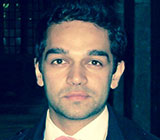 It’s been less than a decade since I started medical school and even in my short career the relationship between doctors and the drug industry has undergone drastic change. During undergraduate clinical placements, I spent many lunchtimes making polite conversation about a drug I had no interest in to justify scoffing the indulgent Waitrose sandwiches and chocolate brownies that the smiley rep had shrewdly chosen. My neatly ironed white coat was never without a pen, tourniquet, or tendon hammer stamped with a drug brand. Others went further and wore drug branded lanyards and stethoscopes around their necks. It was part of the look of the trendy junior doctors we emulated and nobody thought anything of it. I’m not sure people in their twenties are ever venerable enough to say “Oh, how things have changed!” but they really have. This is all but a distant memory now and rightly so.
It’s been less than a decade since I started medical school and even in my short career the relationship between doctors and the drug industry has undergone drastic change. During undergraduate clinical placements, I spent many lunchtimes making polite conversation about a drug I had no interest in to justify scoffing the indulgent Waitrose sandwiches and chocolate brownies that the smiley rep had shrewdly chosen. My neatly ironed white coat was never without a pen, tourniquet, or tendon hammer stamped with a drug brand. Others went further and wore drug branded lanyards and stethoscopes around their necks. It was part of the look of the trendy junior doctors we emulated and nobody thought anything of it. I’m not sure people in their twenties are ever venerable enough to say “Oh, how things have changed!” but they really have. This is all but a distant memory now and rightly so.
So clearly at some point in the last decade, the medical profession fell out of love with the drug industry. It seems the root of this discord may lie in evidence based medicine (EBM) finally becoming established in clinical practice. Although national clinical guidelines have long existed, some stubborn doctors took more convincing and the change in culture towards EBM took time to ingrain. As it did, all clinicians, regardless of their level of academic engagement, began to recognise how heavily we rely on trial data to make treatment decisions. Research questions need to be tested and reported honestly and openly in order to provide answers about how we can best treat our patients.
A wave of scandal in the world of pharmaceutical research and medical journals prompted doctors to take a closer look at the drug industry. Concerns arose about the selective publishing of data, incomplete trial registration, withheld knowledge about adverse events, and the employment of ghost writers. The existence of publication bias was particularly well exposed through meta-analyses of published and unpublished experiments, which demonstrated that missing data have the potential to drastically alter the alleged effect of an intervention.
So began the cynicism and once it had started, it became hard to stop. Are drug companies deliberately asking inappropriate research questions and testing drugs in artificial circumstances in order to exaggerate effects? Are they advertising drugs unethically to patients through celebrity endorsement and other means? Are they too involved in the continuing education of doctors? These are all questions that have been explored in great detail. A theme running through this all is the emotive narrative of doctors being tricked by having data withheld from them and being manipulated by clever marketing strategies. Had all the years of sandwiches, smiles, and pens just been a front for this deceit?
Amidst this emotional drama, we can’t forget that optimising healthcare for patients is always our ultimate goal. Although patients need doctors, they also need drug companies to design and manufacture appropriate drugs to help their care. A 2012 (independently funded) randomised trial of US physicians published in the New England Journal of Medicine demonstrated that drug industry sponsorship negatively influenced doctor’s perceptions of methodological quality and reduced their willingness to act on trial findings. It almost seems as though doctors have gone from being too naïve to being too suspicious. Perhaps this is a way of overcompensating for our years of credulity.
They showered us with gifts, smiled at us sweetly, and made big promises. But in the end we just felt we couldn’t trust them. Doctors were definitely “in bed” with the drug industry for too long, but now that we’ve “broken up” we have to recognise that we actually need a healthy and productive relationship with them. Which brings us to the age old question: can you ever go back to being “just friends?”
Ahmed Rashid is an NIHR academic clinical fellow in general practice at the University of Cambridge.
I declare that that I have read and understood the BMJ Group policy on declaration of interests and I hereby declare the following interests: none.
